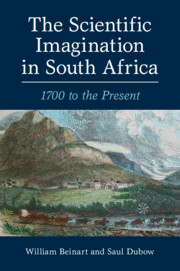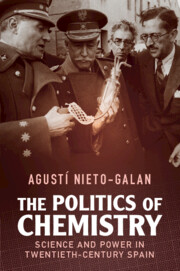Refine search
Actions for selected content:
3 results
Introduction: The Scientific Imagination in South Africa
-
- Book:
- The Scientific Imagination in South Africa
- Published online:
- 07 May 2021
- Print publication:
- 20 May 2021, pp 1-28
-
- Chapter
- Export citation

The Scientific Imagination in South Africa
- 1700 to the Present
-
- Published online:
- 07 May 2021
- Print publication:
- 20 May 2021

The Politics of Chemistry
- Science and Power in Twentieth-Century Spain
-
- Published online:
- 12 August 2019
- Print publication:
- 22 August 2019
